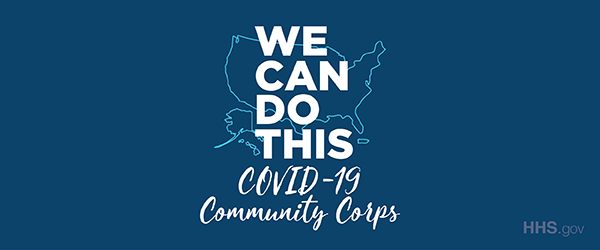
Message to the COVID-19 Community Corps: April 15, 2021
Dear COVID-19 Community Corps Members:
Tuesday night, you and nearly 2,500 fellow trusted messengers joined Dr. Fauci and me to discuss the Johnson & Johnson (J&J) vaccine recommended pause. Thank you for being there. Your leadership in sharing the latest information about COVID-19 vaccines with the communities you serve and engage is essential to addressing this pandemic.
I’d like to take a moment to summarize our discussion:
- On Tuesday (4/13), the Centers for Disease Control and Prevention (CDC) and the U.S. Food and Drug Administration (FDA) announced they are reviewing data involving a small number of reported cases of a rare and serious type of blood clot in individuals after receiving the J&J vaccine. FDA and CDC, out of an abundance of caution, recommended a pause in the use of the J&J vaccine as they review this data.
- Based on what we know now, these blood clots are extremely rare. At the time of the announcement, a small number of cases (6) were reported out of the nearly seven (7) million doses of the J&J vaccine administered so far in the United States.
- If you received the J&J vaccine more than three weeks ago, your risk of developing a blood clot is very low. If you got this vaccine within the last three weeks, your risk of developing a blood clot is also very low. That said, you should be on the lookout for possible symptoms of a clot, which the CDC describes, here.
- The news about the J&J vaccine pause does not affect the two other vaccines that are widely used in the United States – Pfizer and Moderna. More than 100 million people in the U.S. have been vaccinated safely with these vaccines over the past several months.
- We are still confident in the overall supply of COVID-19 vaccines for the country. The Administration has secured enough Pfizer and Moderna doses for 300 million Americans and there is more than enough supply to continue the current pace of vaccinations of three (3) million shots per day.
- For people who already have appointments for J&J vaccines, state and federal partners are working to get these appointments rescheduled for a Pfizer or Moderna vaccine.
- The decision to recommend a pause in administration of the J&J vaccine shows the rigorous steps that the FDA are taking to ensure that the American people have clear and transparent information about the safety and effectiveness of these vaccines. Americans should be confident that even when the occurrence of side effects are extremely rare, as is the case here, the CDC and FDA will take every necessary step to communicate those to the public.
- Yesterday (4/14), the Advisory Committee on Immunization Practices (ACIP) held a public meeting to review in detail the information we have so far, which you can watch here. The Committee will reconvene as quickly as possible in the next two weeks to review any additional scientific evidence and deliberate further. CDC and FDA will carefully consider the Committee’s recommendations when they are made. I appreciate ACIP convening quickly and experts providing advice that prioritizes safety.
- Here’s the bottom line: The COVID-19 vaccines have already saved lives, and we still have vaccine options that are safe and effective, and Americans should continue to get vaccinated as soon as possible.
- As a resource, more information about the safety of COVID-19 vaccines can always be found here.
I invite you to watch and share these resources with your community:
- SHARE a message I posted last night, here.
- SHARE Dr. Fauci’s video on what people need to know about the J&J vaccine recommended pause. ( Facebook, Twitter, Instagram, and YouTube).
- SHARE a new Q&A released from the CDC, here.
- SHARE and LISTEN to a replay of FDA/CDC Joint Media Call on the FDA YouTube channel.
- SHARE and FEATURE our COVID-19 Community Corps Members that tweeted about the event yesterday: @Rikoamour, @SheilaKatz1, @_EricCarr, @bhrenton, @mjaeckel
Thank you for your continued partnership in protecting the health of our nation.
We can do this.
Dr. Vivek Murthy
Surgeon General of the United States
